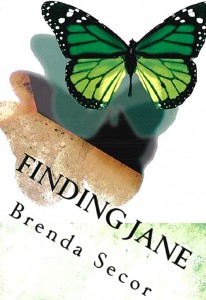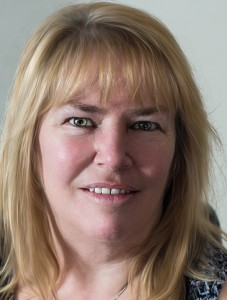Meet the Author: Brenda Secor

The cover of Finding Jane.
Brenda Secor had an horrendous childhood.
Her mother Wanda was an alcoholic who neglected and was violent toward Brenda.
Secor was sexually abused and was placed in several foster homes before running away as a teenager and moving in with and becoming pregnant by an older man, who also turned out to be abusive.
However, the constant source of support in Secor’s life was a social worker named Jane. Eventually, with the encouragement of Jane and others Secor was able to overcome the effects of her turbulent childhood.
Secor, 48, is married and has three adult daughters. The Ontario, Canada native is a financial manager for a nonprofit community service agency.
Secor decided to write the book “Finding Jane” about her experiences and use book proceeds to help others. Some social workers have said it is a must-read book for people who work with children and youth who are at-risk.
SocialWorkersSpeak.org talked to Secor about the book, which was released in 2012:
Q: Why did you decide to reveal your difficult upbringing to the public?
Secor: This question has a lot of answers with the ending result of each, to be able to help others in many capacities, it is my hope to help those who are healing or trying to heal, those who work with children and survivors and to raise awareness so that perhaps fewer children will experience such tragedy. For years I have watched the tragedies of young children who never received the chance or opportunity to be survivors and I have asked myself many times over the years, how do we let such things happen to our precious children? We need to speak out and everyone needs to recognize that we have a duty as a society to protect all children. I work for an organization that provides social housing and social services in my community. Some of our clients are referred to as the chronically homeless or hard to house. I see how difficult it is for them to make changes or even find hope for tomorrow. When I see this I know beyond a doubt that their childhood experiences along with lack of support led them to their current position. As older adults it is so hard for them to find hope, optimism, confidence or any sense of value. Child abuse has taken all these opportunities away. The organization I work for also has a youth housing and support program for youth between the ages of 16 to 24, currently we are able to help about 36 youth a year, with a wait list twice as long. We are the only organization to provide services to youth that include housing, we have youth from Children’s Aid, Probation and Parole along with kids who feel unable to remain at home for a number of reasons. Not all are abused. Since I don’t work front line work as an accountant it is easy for me to stand back and look at the issues. I don’t feel we invest enough in our youth and actually I know we don’t as a community. However, I also understand all about the resources being stretched to the limit for social service organizations. Unfortunately there is not an endless supply of money, or even enough for that matter. So while I had thought about writing my story for 20 years or more the motivation was that in addition to helping people perhaps I would be able to raise some additional money to invest in our youth. Currently I have raised about $1,700 which is to be used for an education fund for youth we are providing services to. I feel if we can get the ones who are ready in the front door of the college for a course they are interested in personally or from a career point of view it will be a great opportunity. It will be a great learning experience for them and will build self confidence. In the event that I am able to raise additional money, the goal would be to expand our services, but that would require property and staffing. Perhaps we may also be able to do some fundraising with this goal in mind.
Q: Do you think social workers are such as Jane are underappreciated? And what can the public do to help them do their jobs better?
Secor: I do believe that social workers are underappreciated. I think their jobs are very complicated and that they are required to assume many roles such as parent, supporter, cheerleader and positive role model, to name a few. Social workers should be teamed up with children for the long term. I truly believe it is in the best interest of both the child and the worker to have that history together. From my experience caseloads have grown making it difficult to share quality time with the kids as well as get the work done. For kids who are crown wards (in Canada), this relationship may be the most stable relationship. Again with budget cuts and an increasing need for services I think that society has also tied the hands of social workers somewhat with boundaries and rules. While I understand the need for boundaries, I also understand the need for a long term relationship that allows the child to feel connected to someone who cares about them and accepts them unconditionally. This book is important in showing that children need to be accepted and supported by their social workers. The social worker is not there to “fix” the child but to care for them, ask about them, listen to them, champion for them and offer guidance when it is asked for. Giving workers the time to do these things and emphasizing their importance is critical.

Brenda Secor. Photo courtesy of the author.
Q: What has been the response to Finding Jane and how is the book being used?
Secor: Finding Jane has been sent out to many colleges and universities as part of my initial marketing campaign. I have received very positive feedback from those who had the time to read it. I have been speaking to classes of students at a few colleges. This semester I have had one college adopt the book as a required reading. I had traveled to Confederation College (Thunder Bay, Ontario) last spring to talk to students in the child and youth worker program. This year I was able to do a Skype presentation with the class after they had read the book and answered the many questions they had. George Brown College (Toronto) has listed the book as a recommended reading. Two other colleges hope to incorporate the book for the September 2014 courses.
Q: Jane is now retired and you continue to keep in contact with her. But do you have a relationship with your birth mother, Wanda?
Secor: I did have a relationship with my mother for a few years, while I was going to college. I tried to build a relationship with my mother as an adult, she had quit drinking finally and I really believed that the issues involving her parenting were related to her drinking. It took me about five years and a few bad experiences to realize that she was totally unable to comprehend anyone’s feelings. I began to distance myself from her, and saw her only when necessary. She passed away in 1997 at the age of 56.
Social workers help young people and their families overcome life’s hurdles. To learn more visit the National Association of Social Workers’ “Help Starts Here” Kids and Families website.
| Leave A CommentAdvertisement
3 Comments
Leave a Comment
You must be logged in to post a comment.



Brenda, I am proud to call you a special neighbor & friend!!! You have risen above such turmoil in your life that….no child/person deserves!
I had the pleasure of working alongside Brenda at the social service agency. Brenda is a huge champion for youth and a truly caring and compassionate individual. Her book is from the heart.
Are you from the ny area albany. If so do you remember me. Hope all is well.